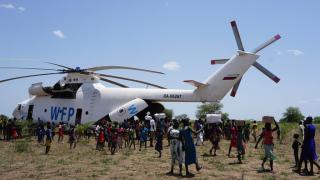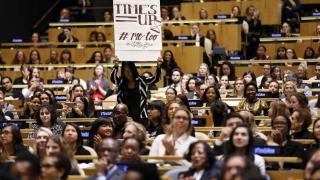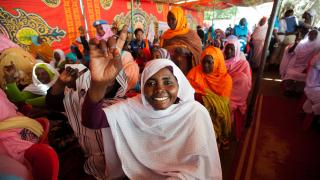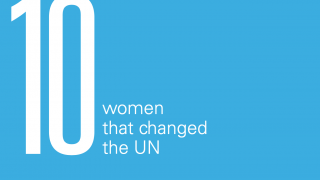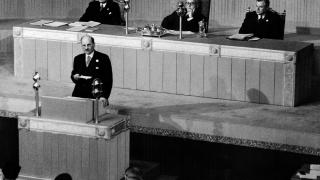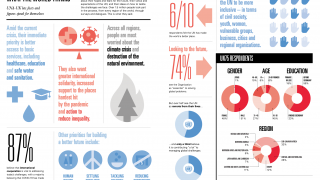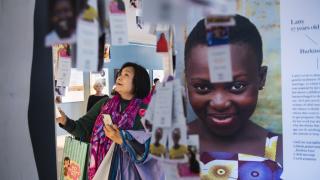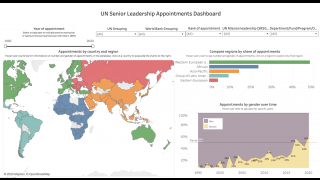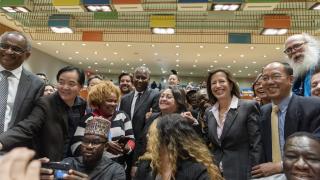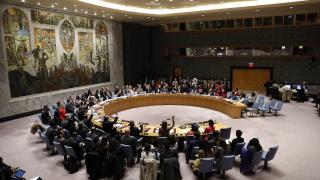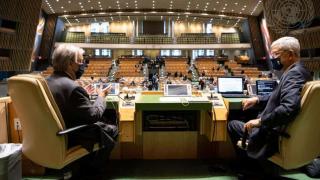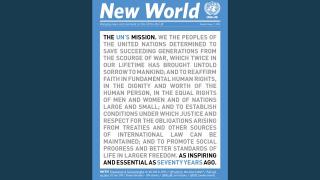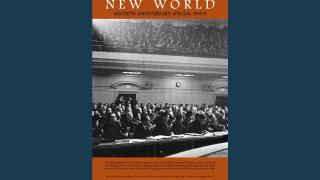
Amid unprecedented turmoil, the UN crowdsourced priorities for a better future – now it’s time to act.
In 2020, the United Nations marked its 75th anniversary (UN75). Born from the ashes of war, it is often romanticised as a product of global idealism. It was also a hardnosed response by wartime leaders, who recognised that the welfare of their citizens was best secured through cooperation and compromise.
In many ways, their calculation has paid off. The prospect of a third world war – one waged with nuclear weapons – seemed frighteningly real in 1945. Back then, one in three people did not live in sovereign states. Most of the global population lacked basic necessities and the means to call for them.
Since then, the UN has helped dozens of countries transition peacefully to independence. It has protected and empowered people by creating laws and standards on everything from human rights to arms control. It has spearheaded the eradication of smallpox and won 12 Nobel Peace Prizes – most recently for its World Food Programme.
Every day, the UN feeds, shelters and protects millions of people. Its peacekeepers are a vital lifeline in some of the world’s most challenging situations. When disaster strikes, it is often the first on the scene and the last to leave. Over the past year, it has been on the frontlines of responding to COVID-19, from providing essential equipment and services, to combating misinformation and assisting countries with research. And it does all this on a shoestring budget – less than what we in the UK spend at Christmas.
But the Organization has fallen short of its promise to future generations. It has said “never again” too many times in the aftermath of atrocities. Too many of us face discrimination and deprivation on a daily basis.
Even before COVID-19, one in three of us did not have access to safe drinking water. Now, we are seeing the first rise in global poverty in over two decades. Meanwhile long-standing challenges such as the climate emergency have faded only from the headlines. If we do not get a grip, they will cause far greater disruption than this pandemic.
Against this backdrop, Secretary-General António Guterres did not want UN75 to be treated as a celebration. Instead, he saw this as an opportunity to listen to the global public, to understand their hopes and fears for the future and their expectations of international cooperation – and the UN in particular.
To that end, in January 2020 the UN launched a global conversation, aimed at sparking discussions in all settings – from classrooms to boardrooms, parliaments to village halls – on how to navigate the gap between the future we want and where we are headed if current trends prevail.
The pandemic made that work more challenging – but also more urgent. Through UN75, we gave people the opportunity to share their priorities for recovering better from the pandemic. Over 1.5 million people from all 195 UN member and observer states took part, with millions more joining the conversation through social media and through our partners on the ground, including UNA-UK’s global Together First network and UNA groups in the UK.
And what did they tell us? Amid the current crisis, they called for better access to basic services, such as healthcare and education, and more support for those hardest hit. Beyond the pandemic, their top concerns were climate change and environmental destruction. They want action to protect human rights, address conflict and reduce corruption. And the vast majority believe that global cooperation is essential to overcoming the challenges we face.
In a world that feels increasingly polarised, it is striking that these views were shared across all regions, ages and social groups. And while the pandemic may have focused attention on basic needs, it also seems to have encouraged big-picture thinking.
In the dialogues we held, people called for the global economy to be transformed. They discussed universal health coverage, universal basic income and affordable access to technology. They demanded an end to fossil fuel subsidies and a ban on lethal autonomous weapons. And they issued a clear call for greater inclusion of civil society and youth in decision-making at all levels, including the UN. (See Lysa John and Mandeep Tiwana’s online article for concrete proposals, including a civil society champion at the UN.)
This must be our turning point. Our aspiration cannot be to return to normal, because normal wasn’t working for most people.
The pandemic has shown that huge transformations are possible, and that vast sums of money can be deployed quickly, when political will is aligned with public support. We can turn this crisis into an opportunity by taking decisions now that put us on the path to a better future for all.
Across these pages, you will find proposals on how we can get there, with essays from Mark Malloch-Brown, Leymah Gbowee and Kristalina Georgieva, as well as reflections from Robert Kaminker, one of the UN’s first employees and Pablo Emiliano Reyes Galindo, a UN75 youth essay competition winner. We also draw inspiration from ten women who changed the UN, and the world, for the better.
Our success will depend on whether we can muster the idealism and pragmatism that inspired the UN’s founding 75 years ago – with bold leadership from governments, an inspiring vision from the Secretary-General and support from civil society and the wider public. This combination is within reach: in September, the General Assembly adopted a UN75 Declaration that commits states to responding to the global consultation and tasked the Secretary-General with recommending next steps.
The world spoke. The UN listened. Now it’s time to act.
Photo: Winning photograph from #TheWorldWeWant, a global photo contest hosted and organized by mobile app Agora in support of the 75th anniversary of the United Nations © Jay Juwan Vicencio


